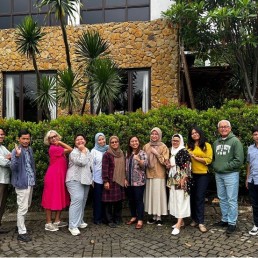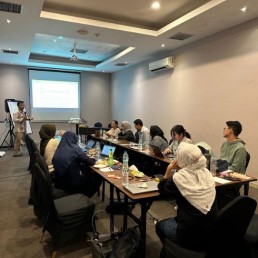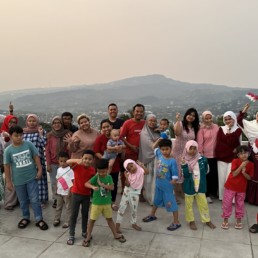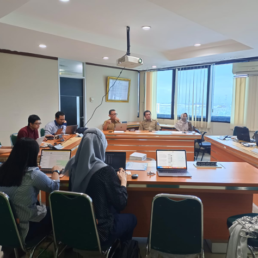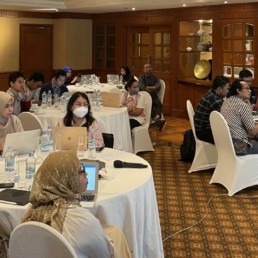“The more complex the challenges that Civil Society Organizations face in pushing public policy reform, the more necessary strengthening institutional capacity from various sides to make organization become more professional, resilient, and sustainable. Civil society organizations also should collaborate with the multi-stakeholder” _ Meliana Lumbantoruan, Program Manager.
PWYP Indonesia works to promote accountability and transparency in the governance of extractive resources in Indonesia for the effectiveness of the public interest, brings a civil society perspective, and strengthens the capacity of civil society organizations (CSOs) to engage an essential role in encouraging governance reforms for extractive resources that have an impact on sustainable development.
PWYP Indonesia has experience collaborating with CSOs and stakeholders such as the Government, the private sector, academics, universities, international development agencies, and various other strategic elements. PWYP Indonesia has also played an essential role in the past decade in promoting transparency and accountability in mineral resource governance in Indonesia. PWYP Indonesia has contributed to policy reform, capacity building, awareness-raising, and community empowerment. However, we realize that there are still many things that need to be strengthened to grow the PWYP Indonesia coalition’s contribution better and create significant community developments.
PWYP Indonesia realizes to enhance its vision and mission, need to strengthen the civil society organizations’ work on empowering communities on promoting public participation in policy reform and accountable governance. PWYP Indonesia believes that an institution will work best when it can strategically achieve its vision and mission, is connected with strategic partners, and can expand its work scope to benefit the wider community. For this reason, institutional strengthening is fundamental in ensuring that institutions and coalitions can grow and develop in the future, both at the national, sub-national and international levels, to achieve common goals.
Until now, post-reform civil society organizations have experienced various ups and downs of working models and movements for social change. Likewise, funding support has continued to decrease, in line with reducing grants for international development assistance and Indonesia’s shift from being a lower to an upper-middle-income country. This situation is undoubtedly a challenge for PWYP Indonesia and most civil society organizations in Indonesia. For this reason, PWYP Indonesia sees the need to carry out a sustainable organizational development strategy, capacity building, and institutional strengthening through various variants of fundraising strategies and network development and collaboration with other strategic stakeholders.
Through the BUILD (Building Institution and Networks) program supported by The Ford Foundation, PWYP Indonesia carries out a strategy for strengthening coalition institutions’ capacity and conducting strategic collaborations with government in encouraging improvements in policy governance. Through the BUILD program’s support, the PWYP Indonesia coalition is expected to become more credible, stronger, and more resilient in the governance aspect of the coalition organization, which can promote social change, good governance, and public policy reform in the extractive sector in the future.
The PWYP Indonesia BUILD program develops 2 (two) strategic work area tracks, which include:
1. Capacity Development and Organizational Strategy
This strategy aims to make PWYP Indonesia (the national secretariat and coalition members) have a more substantial capacity and institutional network, supported by better standard operating procedures and strong leadership that can help institutions promote social change and public policy reform.
On this track, the BUILD program supports coalition organizations’ strategic planning, leadership transition, regeneration, improvement of organizational institutions and operational standards and the development of corporate governance and coalitions that are increasingly competitive and professional. Capacity building is also carried out to improve skills in research and advocacy strategies, improve communication and branding strategies, and develop digital transformation and technology that supports the coalition’s work. This track also carries out collaborative work with government stakeholders in encouraging improvements in the governance of Energy and Mineral sector policies that are transparent, accountable, and sustainable.
2. Development of Financial Resilience Strategy and Organizational Sustainability
The development of this track aims to make the PWYP Indonesia coalition have a strategy and carry out organizational development to become an independent and financially resilient organization so that the organization’s sustainability and independence will increase.
On this track, PWYP Indonesia develops a strategy to increase fundraising capacity for coalitions through various approaches, including project portfolio management, branding strategies, and independent business units that can generate income and added-value economically (generating income). The ‘sociopreneurship’ strategy that collaborates with various potential members of the coalition and the national secretariat is one of alternative that is expected to encourage financial resiliency and the sustainability of the PWYP Indonesia coalition.
Related article
15 February 2024
PWYP Indonesia 2024 National Secretariat Meeting
14 August 2023

